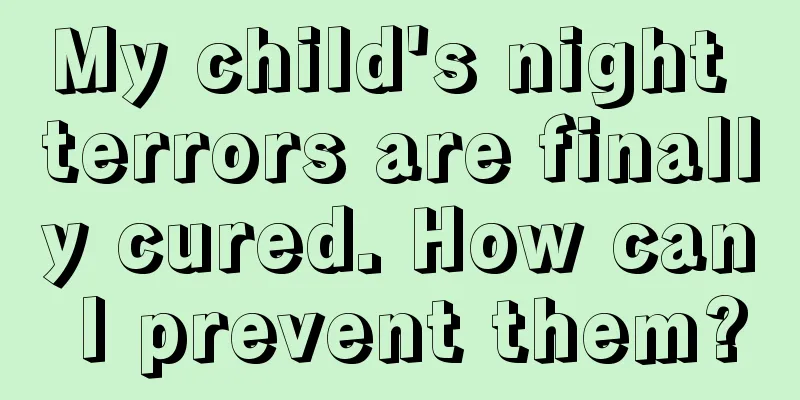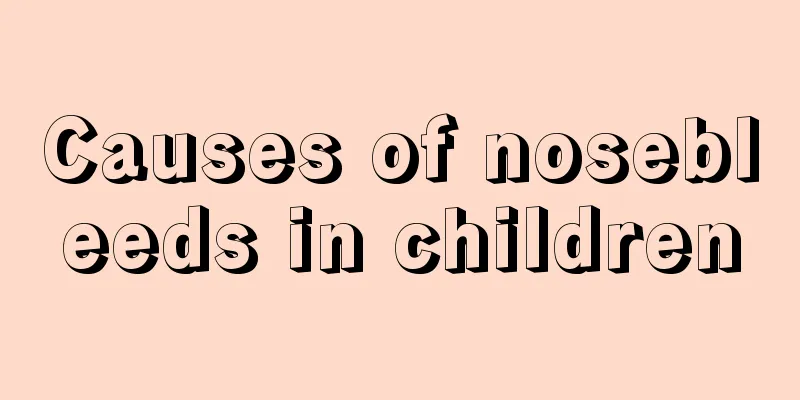My child's night terrors are finally cured. How can I prevent them?

|
In real life, children's growth and daily life require the careful care of their parents. Many children are prone to sudden crying or waking up suddenly when they are sleeping. This is a manifestation of night terrors. Prevention is also very important after the child has recovered from night terrors. Parents should give their children a warm sleeping environment, do not scare their children, and let their children relax. How to prevent night terrors in children? Night terrors occur in approximately 3% of children, with boys slightly more likely to experience them than girls. It can occur at any stage in childhood, but is more common between the ages of 5 and 7 and is rare after puberty. Night terrors usually occur within half an hour after falling asleep, and no later than 2 hours. At this time, the baby is in the fourth stage of non-rapid eye movement sleep. About 2/3 of the children experience it during the first stage of non-rapid eye movement sleep, which is about 15-30 minutes after falling asleep. The clinical manifestation of night terrors is that the child suddenly wakes up after falling asleep for a while, sits up with eyes wide open, becomes restless, and looks terrified. But the consciousness is still hazy, and the patient appears pale, has rapid breathing, dilated pupils, sweating, and a rapid pulse of up to 180 beats per minute. It is usually difficult to wake the child up when called during an attack. The child often ignores you and continues in a state of panic, crying or shouting, nervously grabbing anyone, as if suffering from some intense pain. They turn a blind eye and a deaf ear to their parents' comfort and hugs. This situation often disappears on its own after a period of time, and the child can continue to fall asleep. Some children experience nocturnal wandering during an attack, that is, they get up and walk around, and do some simple mechanical movements, such as opening drawers, but they cannot remember anything after waking up. The frequency of attacks of this disease varies. It may occur several times a night, or once every few days or even every ten days. The main causes of night terrors in children are psychological factors such as tension and fright, for example, a family member is seriously ill or dies suddenly; being separated from their parents for the first time and entering an unfamiliar environment; trauma and accidents that cause the child to be anxious and fearful, etc. In addition, listening to scary and tense stories or watching scary and tense movies or TV shows before going to bed can lead to night terrors. Children who frequently experience night terrors often suffer from long-lasting anxiety. Therefore, it is necessary to further understand the psychological state of the child in order to provide psychological counseling. Parents should not be too nervous about children's night terrors. What needs to be paid attention to is to prevent possible accidents when children have night terrors and night walking, so various safety precautions must be taken. After a night terror, help the child fall back to sleep as quickly as possible and cover him with a blanket. Children's night terrors generally do not require drug treatment, but for those with repeated attacks and frequent frequency, sedatives such as Valium and Diazepam can be used under the guidance of a doctor to control the frequency of night terrors. Taking clomipramine before bedtime also has a certain effect. It must be pointed out that some children with epilepsy also have night terrors. However, their night terrors are just one form of epileptic seizures. For children who often experience night terrors, an EEG examination should also be done to identify the disease early. In order to prevent night terrors from occurring, parents should pay attention to cultivating their children's courage and avoid listening to tense and scary stories or watching tense and scary movies or TV shows, especially at night. The prognosis of this disease is generally good. When the inducing factors are eliminated or as the child grows older, night terrors will gradually heal on their own, and parents do not need to bear too much psychological burden. |
<<: Are there risks in pediatric hernia surgery?
>>: Can children play rafting?
Recommend
My baby hasn't had a bowel movement for 8 days and keeps farting
We all know that constipation is very common for ...
What can children eat to improve their immunity?
If a child has low immunity, he or she is very li...
What to do if your child vomits milk
Vomiting up milk is a common problem for infants ...
Root canal filling materials for deciduous teeth
It is actually quite common to fill the root cana...
What are the hazards of smog to children?
Haze is quite harmful to children, because their ...
What is the best food for children with hernia?
If a child is diagnosed with a hernia, you must p...
Are electric blankets harmful to children?
In winter, parents use electric blankets for thei...
What fruits are better for children with bronchitis?
Once a child's bronchitis attacks, it is ofte...
Why does my baby have a cold, cough and diarrhea?
Many parents will have questions about what is go...
Why is it that the full-month baby has difficulty breathing?
Some parents will find that one-month-old babies ...
Two months old baby has a cough
For two-month-old babies, their body resistance i...
Causes of lymphadenitis in children
Lymph node inflammation in children is a very com...
What to do if your child has a cold stomach and vomits
Whether in winter or summer, it is easy to catch ...
What should children eat to nourish their brains?
In daily life, children's nutrition is crucia...
Why does my baby have diarrhea after drinking milk?
What worries families the most when babies are dr...









